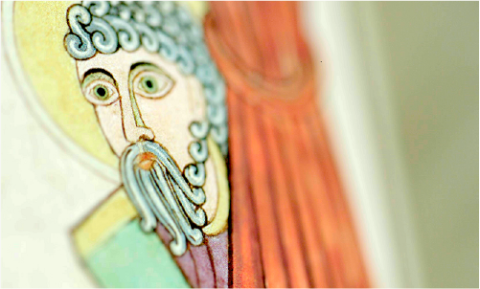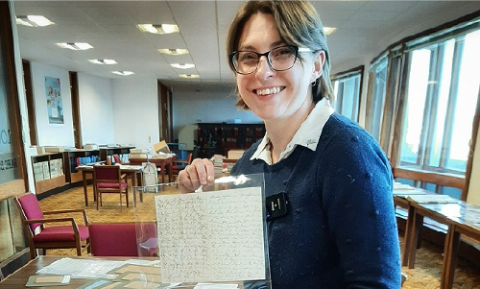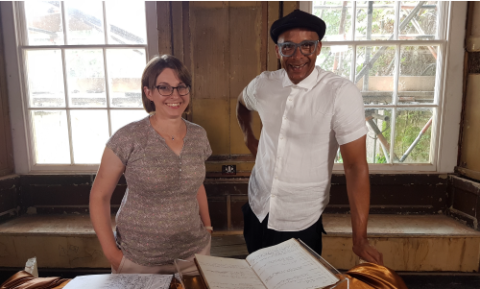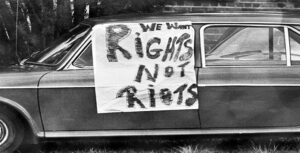Senior Lecturer in History Dr. Anna Plassart has published an article in the Conversation on the Haitian Revolution: Haiti has suffered hugely over centuries but its revolution was stunningly innovative.
Senior Lecturer in History Dr. Anna Plassart has published an article in the Conversation on the Haitian Revolution: Haiti has suffered hugely over centuries but its revolution was stunningly innovative.
While the French Revolution is traditionally seen as the starting point of “nationalist” movements in the 19th century, this project recasts the late eighteenth century as the end point of earlier debates about the idea of
Lecturer in Film and Media Dr Becca Harrison appeared on California State Railroad Museum podcast talking about the development of Cinema Trains in the UK, what these trains represented to travellers, and their ultimate legacy.
Dr. Harrison primarily focuses on the impact of media and technology on class, gender, and race and is the author of From Steam to Screen: Cinema, the Railways, and Modernity. This episode covers the development of Cinema Trains in the UK, what these trains represented to travelers, and their ultimate legacy.
You can listen to the podcast here:
Prof Karl Hack was the guest academic expert on the Imperial War Museum’s Conflict of Interest podcasts, Series 2, episode 1, ‘The Malayan Emergency with Phil Wang’.
IWM: https://www.iwm.org.uk/iwm-institute/conflict-of-interest/series-two
Spotify: https://open.spotify.com/episode/7oxP59TS41ItIUiUlQOHvH?si=5157cac3c97145bb&nd=1

Ground-breaking new OU/BBC co-production Art That Made Us, broadcasting on BBCTwo over eight episodes from 7 April, brings an exhilarating alternative history of the British Isles over 1500 years through art on an epic, yet intimate, scale. The series was guided by academic consultants from the Faculty of Arts and Social Sciences, Professor Sara Haslam, Dr Gemma Allen, and Dr Amy Jane Barnes, supported by Media Fellow Dr Jo Paul.
In a spectacular feast of colour and imagery, well-known and unfamiliar artworks from key points in history are explored in new ways by cultural historians and leading British creatives – including artists, writers, and actors – revealing the impact of historical art upon their own works today.
Dr Amy Jane Barnes, Staff Tutor in Art History highlights the “ambitious and stylish” nature of the series. “The stories presented throughout the series provide a view of art and creativity, one that is both diverse and sometimes subversive, which departs from the well-trodden narratives that will be familiar to many. This collection of stories is rich, engaging and above all accessible. I think it will offer viewers new perspectives on our collective creative past.”
Beginning with the battles after the Romans left, the series focuses on art that emerged at times of crisis and turbulence, the key moments of historical change: the creative renewal following the Black Death; the religious upheavals of the Reformation; the Civil Wars that raged across the kingdoms in the 17th century; the Georgian era’s consumer boom and growth of a new conscience about slavery; the explosive growth of the city during the 19th century; the depths of war in the early 20th century; and the exhilarating expansion of culture, youth, sex and rebellion since the 1960s.
The first episode includes Antony Gormley meeting Spong Man, a unique clay figure that once sat on a 5th century funerary urn, providing a glimpse into the mindset of early Anglo-Saxon settlers. Actor Michael Sheen performs Y Gododdin, a 7th century Welsh poem of resistance. Scottish artists Dalziel & Scullion explore the monumental Aberlemno Stones (ca.500-800 AD) that mark the boundary off the Pictish kingdom. Graphic novelist Woodrow Phoenix takes a fresh look at the propaganda of the Norman conquest in the Bayeux Tapestry.
Dr Gemma Allen, Senior Lecturer in Early Modern History, features prominently in the third episode, bringing her expertise to discussions around “Queens, Feuds and Faith”, as first England, then other parts of the British Isles, turned Protestant. She was “delighted that I feature in the episode on the 16th century, and that I am able to share with viewers the hidden messages contained in Mary Queen of Scot’s needlework. Why does this queen in captivity decide to embroider a ginger cat playing with a little grey mouse? Is it just an appealing design, or is it a commentary on her relationship with Elizabeth I? Is Elizabeth I the ginger cat who is tormenting her?
“In contributing to this episode, I was able to draw on my own research on 16th century women’s political activity – it’s something that’s often overlooked, especially for non-royal women, but I believe that you can’t understand the politics of the time without including women’s activities.
“That’s something that all the nominated academics were keen to do in our work on this series: we wanted to help the production team bring to the screen overlooked stories of creativity that challenge accepted ideas about our history.”
For Professor of 20th-Century Literature Sara Haslam, “being involved with the series as an OU academic has reminded me how vital it is to tackle master narratives when considering and curating a nation’s cultural and creative histories. Those top level narratives, helpful as they may be for some storytelling, are built on a richness and variety that needs to be seen to be believed!
“Little-known objects of beauty or interest; lesser-known creative artists with diverse stories to tell – what a great way to explore and celebrate the rich cultural history and heritage of the nations. I’ve hugely enjoyed playing a part in this project.”
Discover more about the series with extra content, exclusive interviews with contributors to the series, and nine inspiring creative women that history overlooked, at Broadcast and Partnerships
Image: A page of the Lindisfarne Gospels, displayed in the British Library. Copyright ClearStory/ Menace

Dr Rosalind Crone, Head of History and Senior Lecturer, is Historical Consultant for new BBC production Lady Killers with Lucy Worsley, and appears throughout the series, which broadcasts from 27 April on BBC Radio Four and is available on BBC Sounds from 25 April.
Ros explained that the series is “a curated collection of 19th century murderesses from Britain and North America who together provide a representative portrayal of female living and killing in the Victorian age. The murderesses featured in this series include those who continue to be household names today, and those long since forgotten.”
Taking a contemporary, feminist perspective throughout, “this is a series about women – their lives and problems – and we wanted to hear what they had to say about the circumstances they found themselves in. Each episode includes their words, extracted from the surviving historical evidence, and voiced by actors.”
“Through extraordinary circumstances – murder – which create rich historical evidence, the ordinary lives and problems of women in 19th century Britain and North America come to light. The historical evidence produced by these extraordinary cases provides a window into the lives, ambitions and predicaments of 19th century women from across the social spectrum.”
The unique feminist perspective was an important element in the research and production of the series. Ros noted that “this series would have been impossible without the tremendous work of historians of women, gender and criminal justice which has accumulated and deepened in extraordinary and imaginative ways over the past fifty years.
“Throughout the series, we worked hard to try to expose the craft of the historian to listeners, especially the discovery and use of historical evidence to shed new light on the lives of women in history.”
In the first episode, Ros and Lucy Worsley explore the Balham Mystery and the story of Florence Bravo in one of the most sensational unsolved murder cases of the Victorian era. They visit the pub where the inquest into Charles Bravo’s death was held, near The Priory, the grand house in Balham where, on 21st April 1876, after three days of agony, Florence’s young husband Charles died of poisoning. The death was a Victorian media sensation. Was Florence a ruthless poisoner or an abused wife?
Ros noted that “one of the highlights of working on this series was getting out and about, visiting the locations where key events in these stories took place. What was it like to be at a murder inquest in a room above a public bar? Given the physical structure of the house, could this murder really have happened in the way that prosecutors described it?”
Each episode focuses on a different woman’s story, taking an in-depth look at the crime with an all-female detective team of historians, lawyers, journalists and psychologists, exploring how the crime was received at the time, and how it would compare to today’s reception.
Further details of the series can be found at the BBC website.

Two Historians from The Open University consulted on a new three-part series exploring the history of Hackney, broadcast on Channel 5 from 3 May.
Jay Blades: No Place Like Home sees Jay Blades (of BBC’s Repair Shop fame) return to his home community of Hackney, interviewing experts, local Black musicians and artists, as well as old friends, in a blend of personal stories, culture and history as he explores the place he thought he knew so well, discovering there is often much more than meets the eye.
Dr Katie Donington, Senior Lecturer in Black, African and Caribbean History, was approached by the production company Hungry Jay Media to advise on content for the programme. “They were looking to include a segment on Hackney’s history of slavery and abolition. The documentary is a chance to make those links for a wider audience using personal and local history to connect to Britain’s history and legacies of slavery.
“I’d spent two years working on an Arts Council England funded public engagement project ‘Local roots / Global routes: Legacies of slavery Hackney’. This was a partnership with Hackney Museum and Archives. We produced research which demonstrated how the local area had been shaped by transatlantic slavery including stories of local slave owners and slave traders, abolitionists and those that had been enslaved.”
Katie explains that, following the Black Lives Matter protests in 2020, Hackney Council commissioned a review into its sites associated with slavery. “Hackney is home to many diverse communities including people of African and Caribbean heritage like Jay, so this history is significant to residents in the present.
“The producers invited me to be interviewed about these histories at Newington Green Church in Hackney. This is an important site for Hackney’s history abolition – supporters of the campaign Mary Wollstonecraft and Anna Laetitia Barbauld were members of the congregation, but it was also a place which some slave-owning families were connected to.”
Appearing in the first episode, Katie and Jay “discussed the links between the history of slavery and racism today. Growing up in Hackney he had painful memories of the discrimination he faced including within the school system. As a historian of slavery, I believe it’s important that people know about this history not just so that they can understand how it has shaped the built environment – statues, country houses and street names – but so they can unpick the racial thinking that was used to justify systematic inequality and oppression.”
Head of History and Senior Lecturer Dr Rosalind Crone is an expert on the society and culture of nineteenth-century Britain, and particularly criminal justice, popular culture, education and reading practices, creating the first map of the penal landscape of nineteenth century England as part of her Prison History project. For several years, she has been working on the general theme of educating criminals, with her Illiterate Inmates: Educating Criminals in Nineteenth-Century England published in May 2022. In the third episode, Rosalind and Jay explore the former Elizabeth Fry Refuge Hostel for discharged female prisoners at 195 Mare Street in Hackney.
Elizabeth Fry was a leading figure in the early 19th century penal reform movement, campaigning for the separation of male and female prisoners, and for the superintendence of female prisoners by female officers. She understood that female prisoners were in need of protection from abuse, being among the most vulnerable in society. Fry also worked hard to transform the regime inside prisons, arguing that the women should be given employment, basic education, and religious instruction in order to ensure their lives were more meaningful and less criminal on release.
After her death in 1845, friends and admirers of Fry, with donations (including from Queen Victoria), established a refuge for released female prisoners in her name, on Mare Street, Hackney. Until 1913, the Refuge provided a home for women released from prisons in London who had nowhere to go while they rebuilt their lives, under a strict regime with hard work. Rosalind and Jay reconstructed some of the poignant stories of women who were sent to the Refuge using a surviving case book from Hackney Archives and census records.
Broadcast from Tuesday, 3 May at 9pm on Channel 5, the three-part series is also available via My5. It is a Hungry Jay Media production for Channel 5.
On Saturday 2nd April, Professor Annika Mombauer gave a well-received lecture to the OU History Society. The lecture explored German attitudes towards the Armistice in November 1918 and the Treaty of Versailles. It asks why Germans do not mark Armistice day with a minute’s silence and whether in fact peace began for Germans on 11th November 1918.
Co-led by Dr John Slight and Dr Sinead McEneaney, several colleagues have created this new free course on Open Learn, Historical Perspectives on Race.

Race is not biological. It is a social construction. Yet we know that in our contemporary world and in history, this construction has real consequences. From enslavement and colonisation to resistance and revolution, the stories of people of colour are often left untold in accounts of the past. This free course, Historical perspectives on race, will introduce students to ideas and scholarship dealing with the construction of race, and help students to start exploring people’s lived experiences of race through a set of case studies from the late eighteenth century onwards.
The OU History Department has been awarded two Collaborative Doctoral Awards through the AHRC-funded Oxford-Open-Cambridge Doctoral Training Partnership. The first is co-supervised by Senior Lecturer Dr Anna Plassart and the second is co-supervised by Senior Lecturer Dr Richard Marsden
The late Scottish Enlightenment in global perspective, 1770-1815
Welshness in the museum: Representing the past in Wales’ National Museums, c.1900-1975